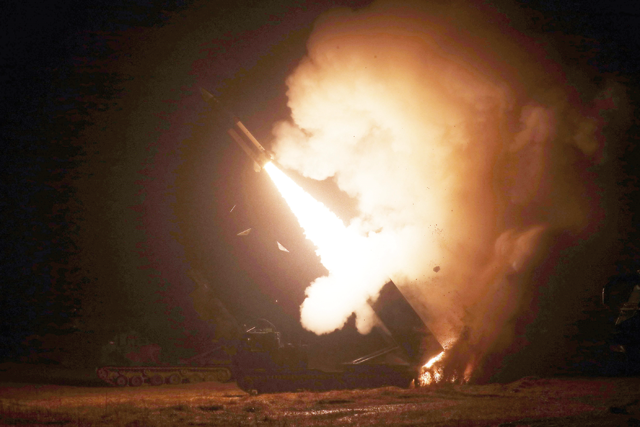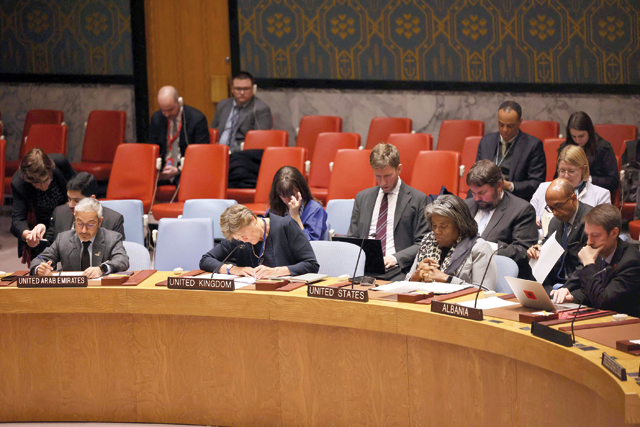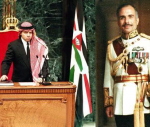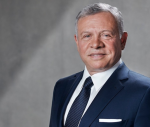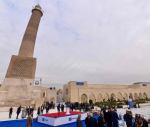You are here
North Korea fires more missiles, 7th launch in two weeks
By AFP - Oct 09,2022 - Last updated at Oct 09,2022
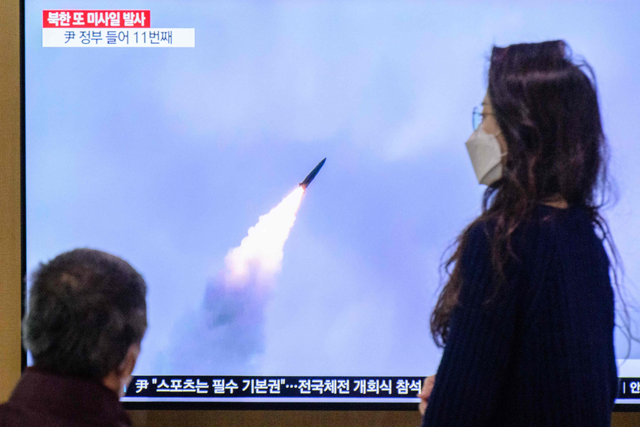
People watch a television screen showing a news broadcast with file footage of a North Korean missile test, at a railway station in Seoul, on Sunday (AFP photo)
SEOUL — North Korea fired two ballistic missiles into the sea early Sunday, Seoul's military said, the seventh such launch in two weeks, just hours after a nuclear-powered US aircraft carrier concluded joint drills off the Korean Peninsula.
Seoul, Tokyo and Washington have ramped up combined naval exercises in recent weeks, infuriating Pyongyang which sees them as rehearsals for invasion and justifies its blitz of missile launches as necessary "countermeasures".
With talks long stalled, Pyongyang has doubled down on its banned weapons programmes, firing an intermediate-range ballistic missile over Japan last week, with officials and analysts warning it has completed preparations for another nuclear test.
South Korea’s military said Sunday it had “detected two short-range ballistic missiles between 01:48 and 01:58 (16:48-16:58 GMT) fired from the Munchon area in Kangwon province towards the East Sea”, also known as the Sea of Japan.
The missiles “flew approximately 350 kilometres at an altitude of 90 kilometres”, Seoul’s joint chiefs of staff said in a statement, calling the launches a “serious provocation”.
Tokyo also confirmed the launches, with the coast guard saying the missiles had landed outside Japan’s exclusive economic zone.
Japanese senior vice defence minister Toshiro Ino said Tokyo was analysing the missiles, adding that “either one of them has the possibility of being a submarine-launched ballistic missile [SLBM]”.
Seoul said last month it had detected signs the North was preparing to fire an SLBM, a weapon Pyongyang last tested in May.
US National Security Council spokesman John Kirby said North Korean leader Kim Jong-un has rebuffed Washington’s calls for talks and instead chosen to “improve” his ballistic missile programme.
“He’s clearly not abandoned his nuclear weapons ambitions,” Kirby told ABC News on Sunday.
“We’re going to make sure that we have the capabilities in place to defend our national security interest if it comes to that. But there’s no reason for it to come to that,” he said, adding the United States was committed to “a diplomatic path forward”.
Drills, drills, drills
North Korea’s missile tests usually aim to develop new capabilities, but its recent launches, “from different locations at different times of day, may be intended to demonstrate military readiness”, said Leif-Eric Easley, a professor at Ewha University in Seoul.
“The Kim regime is trying to coerce Seoul, Tokyo and Washington to abandon their trilateral security cooperation.”
At an emergency meeting of Seoul’s National Security Council following the missile test, however, South Korean officials vowed to strengthen that cooperation, according to a statement.
The recent spate of launches is part of a record year of weapons tests by isolated North Korea, which Kim last month declared an “irreversible” nuclear power, effectively ending the possibility of denuclearisation talks.
Seoul, Tokyo and Washington have ramped up joint military drills in response, with the USS Ronald Reagan aircraft carrier and its strike group redeployed to the area last week.
On Thursday, Seoul’s military said it had scrambled 30 fighter jets after 12 North Korean warplanes staged a rare formation flight and apparent air-to-surface firing drills.
Go Myong-hyun, a researcher at the Asan Institute for Policy Studies, said North Korea was trying to claim that the nature of its sanctions-busting weapons tests were the same as the defensive joint drills between the allies.
“North Korea is trying to give equivalence through its continued missile launches,” he told AFP.
No new sanctions
Analysts say Pyongyang is emboldened to continue its weapons testing, confident that gridlock at the United Nations will protect it from further sanctions.
Last week, the UN Security Council held an emergency meeting to discuss Pyongyang’s launch over Japan, which officials and analysts said was a Hwasong-12 that likely travelled the longest horizontal distance of any North Korean test.
But at the meeting, North Korea’s longtime ally and economic benefactor China blamed Washington for provoking the spate of launches, with Deputy Chinese Ambassador to the UN Geng Shuang accusing Washington of “poisoning the regional security environment”.
US ambassador to the UN Linda Thomas-Greenfield called for the “strengthening” of existing sanctions on North Korea, something China and Russia vetoed in May.
The Security Council has been divided on responding to Pyongyang’s nuclear ambitions for months, with Russia and China on the sympathetic side and the rest of the council pushing for punishment.
Officials in Seoul and Washington have been warning for months that Pyongyang will also conduct another nuclear test, likely after China’s Communist Party Congress later this month.
“A flurry of missile tests like the one we’ve seen could indicate a build-up to a nuclear test, but predicting the timing with any precision is quite challenging,” US-based security analyst Ankit Panda told AFP.
Related Articles
SEOUL — The South Korean and US militaries fired a volley of missiles into the sea in response to North Korea firing a ballistic missile ove
SEOUL — North Korea rejected on Wednesday condemnation by the United Nations chief of its recent ballistic missile launches, saying it was “
SEOUL — North Korea fired a ballistic missile over Japan for the first time in five years on Tuesday, prompting Tokyo to activate its missil


